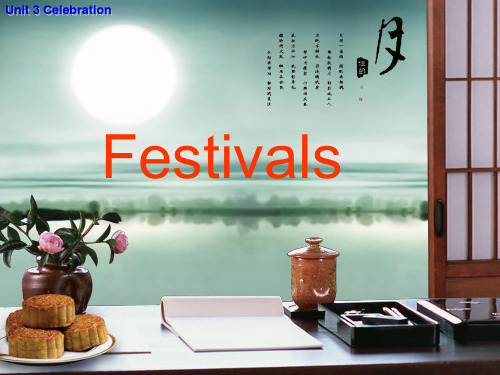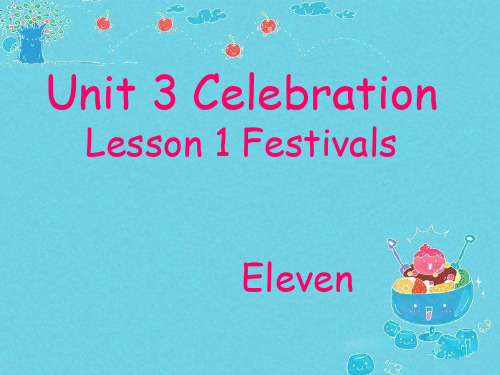北师大版高中英语unit3-lesson1-festivals
- 格式:ppt
- 大小:1.91 MB
- 文档页数:18






Unit 3 Lesson 1 FestivalsPeriod 1 Warm-up & Reading一.Learning Aims学习目标1. Knowledge aim(知识目标):To grasp the basic usage of words and expressions in this lesson.2. Ability aim(能力目标)①To develop good habits of reading.②To acquire more reading skills and improve reading ability.3. Emotion aim(情感目标)①To know more about our traditional culture.②To foster a sense of national pride.二.Background information背景信息中国主要的传统节日有:春节The Spring Festival,元宵节The Lantern Festival,清明节Tomb Sweeping Day,端午节The Dragon Boat Festival,七夕节Qixi Festival,中秋节Mid-Autumn Festival,重阳节Double Ninth Festival,腊八节Laba Festival,除夕New Year’s Eve等三.Pre-reading读前Lead-in: a short video about Chinese traditional festivalsQuestions:①Q1: How many festivals are there in the video?②Q2: What are they?四.Fast reading速读Please skip the text quickly and match the following items.(一分钟时间跳读文章,完成连线。
北师大版高一Unit3CelebrationLesson1Festivals教学设计北师大版高一Unit 3 Celebration Lesson 1 Festivals教学设计一. 教材分析1.本课在本单元的地位和作用:本单元的主题为festival“节日”, 主要介绍中外国家的一些主要的节日和节日的庆祝活动.通过本课的学习,学生能够了解一些我们国家和西方的主要节日和活动,熟悉并掌握在谈论这些节日时需要的话题和重要词汇及短语,最后通过自主学习和合作学习实现用英语简单的介绍一个主要节日.这样就为后几课在语言知识和语言技能上做好了铺垫.2.教学目标分析:本文文章结构非常简洁明了,分别描述了中国的三个传统节日:中秋节, 元宵节和端午节和西方比较重要的两个节日:圣诞节和万圣节。
由于本文是单元导读课, 因此学生通过听、说、读、写等一系列活动掌握并运用所学语言知识是本文的重点.根据新课标中强调“要注重提高学生用英语进行思维和表达的能力”这一要求,结合教学内容和学生特点及实际情况, 我就把最终的语言输出设置为:创造一个新的节日:学生节。
二. 学生分析由于我们的学生学习水平参差不齐,而且基础较差,因此在设计学生活动时要考虑到不同层次学生的具体情况和不同需求.因此,我在教学中设置了不同层次的问题,设定了不同层次的目标,如: A层同学介绍节日时选三个话题讨论,B 层同学选四个话题讨论,C层即最高级选五个以上话题进行介绍.这样就满足不同学生的发展要求,这也是新课标所倡导的.三.教学目标1)学会用英语简单介绍中西方的节日。
2)进一步了解我国的一些主要的节日及其相关的历史源源,从而尊重传统文化,增强爱国主义精神。
3)发挥团队合作精神,创作学生节海报。
4)通过文化的了解,增强爱国主义精神和民族自豪感,提高对中外文化异同的敏感性和鉴别能力,为跨文化交际能力打下基础。
重点与难点:1)如何让学生在阅读活动中获取信息,理解全文。
北师大版高中英语必修一u n i t3l e s s o n1F e s t i v a l sCelebrationFestivalsPart A Warm-up:1. Look at the photos. What are the people celebrating?Key Words:graduation, a birthday, Christmas, passing an exam, winning a scholarship, a sporting victory, the Mid Autumn Festival, the New Year, a wedding, Halloween, the Dragon Boat Festival2. What have you celebrated recently?Part B Reading: FestivalsBefore you start1. What’s your favourite season? What festivals happen during your favourite season?FestivalsA: AutumnEvery year in September or October, the Mid-Autumn Festival is celebrated by the Chinese people all over the world. On this day, the moon is said to be its biggest and brightest. People like to meet in the evening and watch the moon.The Mid-Autumn Festival is important because it is a special occasion for family. It is also a day for special foods like moon cakes. There are all kinds of moon cakes. Traditional moon cakes are usually made with bean paste, but nowadays, there are many different kinds of moon cakes including fruit, coffee, chocolate and even ice-cream moon cakes.B: WinterThe Lantern Festival falls on the fifteenth day of the first lunar month. It marks the end of the Chinese New Year celebration s.There are many stories about how the Lantern Festival started. In one story, lanterns were lit to celebrate the power of light over darkness. In another story, a town was almost destroy ed but the light from many lanterns saved it. The story was about a god who wanted to burn down the town. He was fooled when he saw thousands of lanterns. He thought the town was already burning.In the past, lanterns were usually lit by candles and decorate d with pictures of birds, animals and flowers, etc. Nowadays, most lanterns are made with light bulbs and batteries, and they come in many shapes and sizes. In the north-eastern part of China, there are even ice-lanterns.The special food for the Lantern Festival is the sweet dumpling. Sweet dumplings are boil ed and serve d in hot water.C: SummerThe Dragon Boat Festival falls on the fifth day of the fifth month of the lunar year, As it is in early summer, it marks the beginning of the hottest season of the year.The tradition of the Dragon Boat Festival started more than 2,000 years ago. In the old days, dragon boat races were organized only by Chinese people. However, in recent years, people from other cultures have also taken part in races and enjoyed the fun.There is a special food for the festival. It is called zongzi, which is sticky rice in fresh bamboo leavesRead to learn2. Read the texts again and fill in the table with the information you read from the texts. Add another typical festival that you know well.voice your opinion3. Do you think too much money is spent at festival times? Why or why not?4. Which festival in China is most important for children? Young people? Old people? Women and men?Part C Grammar: The Passive5. Look at the first sentence in each group and complete the second sentence with the correct verb forms.(1) …the Mid-Autumn Festival is celebrated by Chinese people all over the world.Traditional moon cakes (make) with beam paste.(2) In one story, lanterns were lit to celebrate the power of light over darkness.In the old days, dragon boat races only (organise) by the Chinese people.6. Look at the given sentences and work out the correct verb forms of the other sentences.(1) A school fot the blind has been opened in the area.The wedding celebration (arrange).(2) The theatre is being built in the centre of the city.The money (collect) for the disabled.(3) The girl was being operated on in the hospital.The house (paint) white when I was there.★ We use the Passive in the following cases:(1) 不知道也不需要知道谁做的这件事时:The streets were decorated with flowers.(2) “动作执行者”显而易见时:Rice is grown in the south of China.(3) 动作本身比“动作执行者”更重要,或不想指出谁做的这件事时:These beliefs were not encouraged by the church.(4) 在书面语,特别是在科技报告、报刊文章中,被动语态比主动语态更正式。